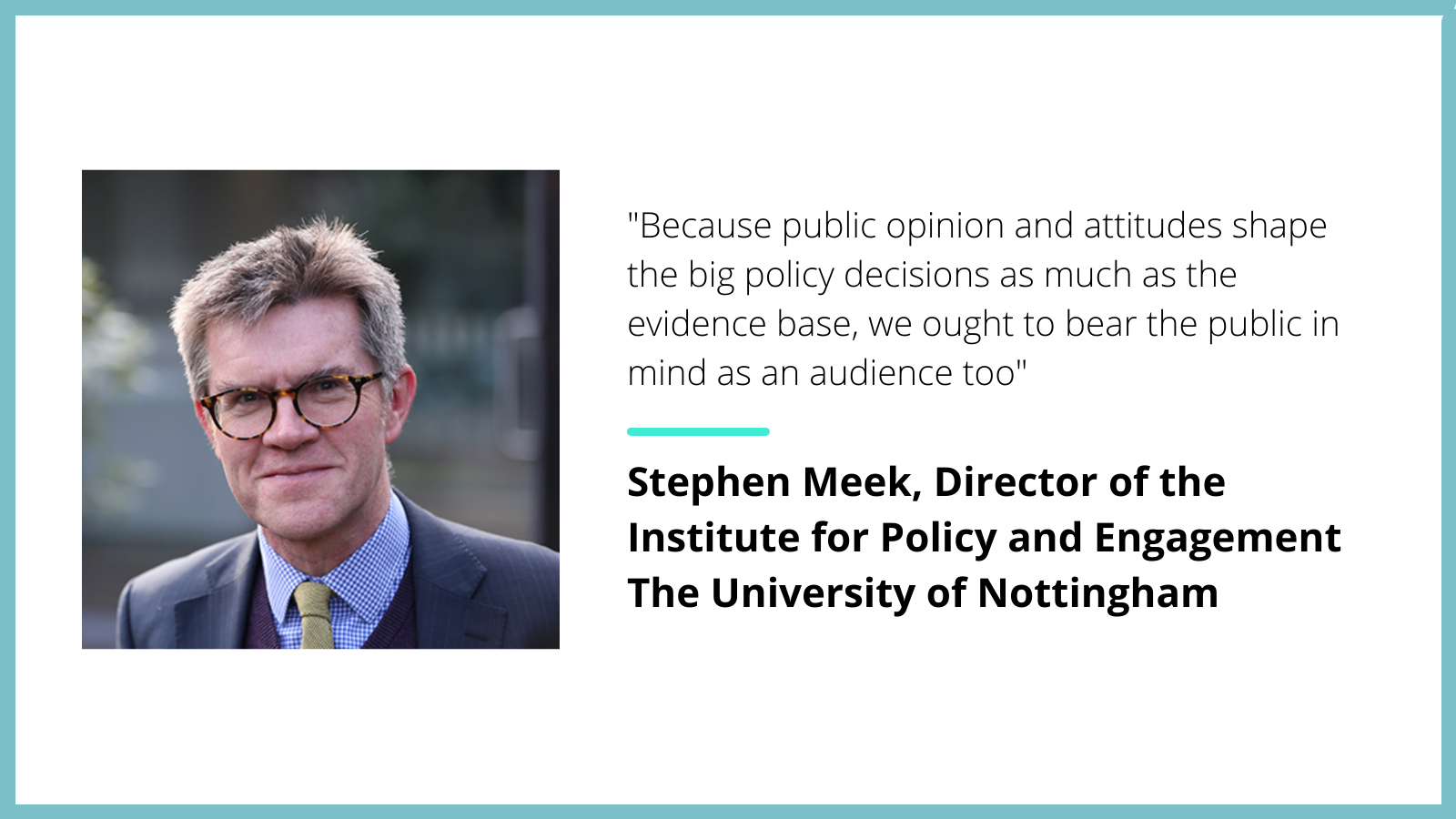Policy Impact and Public Engagement - Two Sides of the Coin?

In a blog I wrote for Wonkhe to coincide with the launch of the University of Nottingham’s Institute for Policy and Engagement back in October 2019 (hard to imagine that we had an actual, physical launch – with people, canapés, drinks and no sticky mute buttons or intermittent broadband connections to spoil the fun) I explored how the two parts of the Institute’s remit – policy impact and public engagement – connected and had the potential to reinforce one another.
The core of the argument is that public opinion shapes policy decisions, particularly the big calls, as much as the evidence base. This is an obvious point, but one we often neglect as we focus on securing the attention of policymakers and those who advise and influence them.
As knowledge brokers we know that policy making is a synthetic activity in which the evidence is brought together with considerations of resource availability, opportunity costs, interaction with other priorities, values and political deliverability and public attitudes to shape policy decisions.
The fact that policy decisions reflect considerations other than the evidence base doesn’t make them bad decisions, or worse decisions than if politicians “just followed the evidence”. It is simply part of what a policy decision is. Policymakers have to choose, for example between competing priorities for cash, people and time, and have to win political and public support or they won’t be in a position to do anything.
The supply of evidence – the bread and butter of what UPEN members do – is critical, of course. So spending time making the right connections, honing the pitch, presenting the evidence in a way that is easily digested and directly relevant to the environment in which decisions are made is time well spent.
However, because public opinion and attitudes shape the big policy decisions as much as the evidence base, we ought to bear the public in mind as an audience too. To take an obvious example which looms over everything: tackling the climate emergency is going to demand a huge amount from people. They are going to have to change behaviours, meet costs, acknowledge intergenerational and global inequity.
Politicians’ reluctance to act on what seems to many to be overwhelming evidence can be a source of frustration for experts and campaigners. Why can’t they be brave? But politicians aren’t re-elected by the grateful populations of 2050. They face a public who on this question are variously committed, confused or sceptical, or are too preoccupied with the pressure of the here and now (caring, cost of living…). There is a huge risk for politicians in running too far ahead of the public, and a temptation (which we are seeing in the UK governing party barely two months after it made commitments on the global stage at COP26) to exploit that risk for short term political gain.
So the role researchers can play in engaging with the public to explain the challenge, and crucially showing not just that we are doomed but how there are practical and liveable steps which can make a difference, is going to help change the political calculus.
Climate change is the big example, but this holds true in different ways in other areas – in the response to the pandemic, or in facilitating informed debates about the growing role of technology, algorithms and autonomous systems in our lives, for example.
Engaging on a national stage and in the media is an important channel to do this, and there are many examples of great communicators in the space (Nottingham’s own Professor John Van Tam being one). But so are local activities and engagement.
In common with no doubt every other university we ran a campaign to highlight research to coincide with COP26 aimed at national audiences. And like many universities we struggled for attention because of the sheer volume of material being pumped out. But, again like other universities, we also ran a set of local activities, including a “pop up” space in an empty shop Green Light in the City with partners including local charities, the City Council and Nottingham Trent University. The activities, talks and events held in that space, focussing on what people can do in response to the climate emergency, will have made a difference by giving people the opportunity to ask questions, reflect and engage with the evidence on the challenge and what can be done about it.
These things are incremental. But even when they are small scale they help make a difference, and create an environment where actions that seem politically beyond the pale might become possible. Public engagement is not just “show and tell” but a space for dialogue and a route to real world impact.
Stephen Meek is Director of the Institute for Policy and Engagement at the University of Nottingham. He previously worked in the UK Civil Service.










































































































